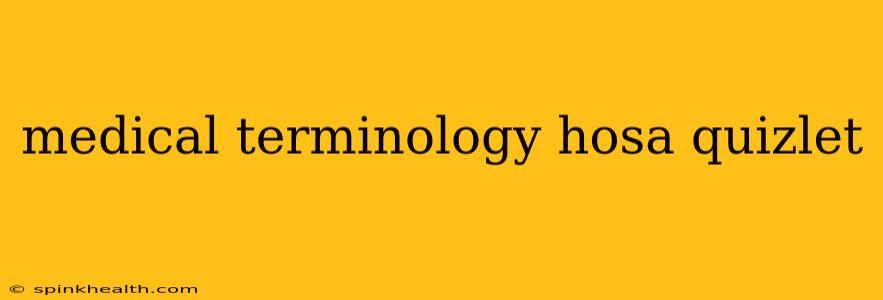Decoding the Medical Mystery: Mastering Medical Terminology for HOSA
The hushed whispers of the hospital hallway, the rhythmic beeping of machines, the urgent crackle of the radio—this is the world of medicine, a world brimming with specialized language. For HOSA competitors, navigating this terminology is key to success. This isn't just about memorizing definitions; it's about understanding the story each medical term tells. Let's embark on this journey together, unlocking the secrets of medical terminology and boosting your HOSA quizlet game.
Imagine yourself in a bustling emergency room. A patient arrives, pale and gasping for breath. The doctor shouts out orders, using terms like "tachycardia," "dyspnea," and "hypoxia." Knowing what these mean isn't just about passing a test; it’s about understanding the patient's critical condition and the urgency of the situation. This is the power of medical terminology.
What are some common prefixes, suffixes, and root words used in medical terminology?
This is where the puzzle pieces come together. Medical terminology is built upon a foundation of prefixes, suffixes, and root words. Think of it like learning a code; once you crack it, the language becomes far more accessible. Let's explore some common examples:
-
Prefixes: These come at the beginning of a word and often indicate location, number, or status. For instance, "tachy-" means fast (tachycardia – fast heart rate), "hypo-" means under or below (hypoxia – low oxygen levels), and "hyper-" means above or excessive (hypertension – high blood pressure).
-
Suffixes: These are added to the end of a word and often describe a condition, procedure, or process. "-itis" indicates inflammation (appendicitis – inflammation of the appendix), "-ectomy" indicates surgical removal (appendectomy – surgical removal of the appendix), and "-osis" usually denotes a disease or abnormal condition (psychosis – a severe mental disorder).
-
Root words: These are the core of the word and often refer to a body part or system. "cardi" refers to the heart (cardiomyopathy – disease of the heart muscle), "hepat" refers to the liver (hepatitis – inflammation of the liver), and "derm" refers to the skin (dermatitis – inflammation of the skin).
How can I use flashcards or other study methods to memorize medical terminology effectively?
Flashcards are your best friend! But don't just write down definitions; create active recall scenarios. For example, instead of "cardi - heart," try "What medical term describes inflammation of the heart muscle?" The answer, of course, is myocarditis. This method forces your brain to work harder, improving retention. Other effective study methods include:
- Spaced repetition: Review material at increasing intervals. This helps solidify long-term memory.
- Mnemonics: Create memorable phrases or acronyms to associate with difficult terms.
- Study groups: Quiz each other and discuss challenging concepts.
- Quizlet: Utilize the platform to create customized sets, practice tests, and learn from others' creations.
Are there any resources available online or in textbooks to help me learn medical terminology?
The world is your oyster! Numerous online resources are available, including medical terminology websites, YouTube channels dedicated to medical education, and interactive apps that make learning fun. Textbooks designed for medical professionals or allied health students are also invaluable resources. Don't limit yourself to just one resource; explore different options to find what works best for your learning style.
What are some tips for success in a HOSA medical terminology competition?
Success isn't just about knowing definitions; it's about strategy.
- Practice, practice, practice: The more you work with medical terms, the more comfortable you'll become.
- Understand the context: Don't just memorize; understand the meaning behind the terms.
- Time management: Practice answering questions under time constraints.
- Stay calm: If you encounter an unfamiliar term, don't panic. Break it down into its components.
Mastering medical terminology is a journey, not a sprint. By breaking it down into manageable parts, utilizing effective study techniques, and maintaining a curious mindset, you’ll not only excel in your HOSA competition but also gain a profound appreciation for the rich and complex language of medicine. Good luck!

